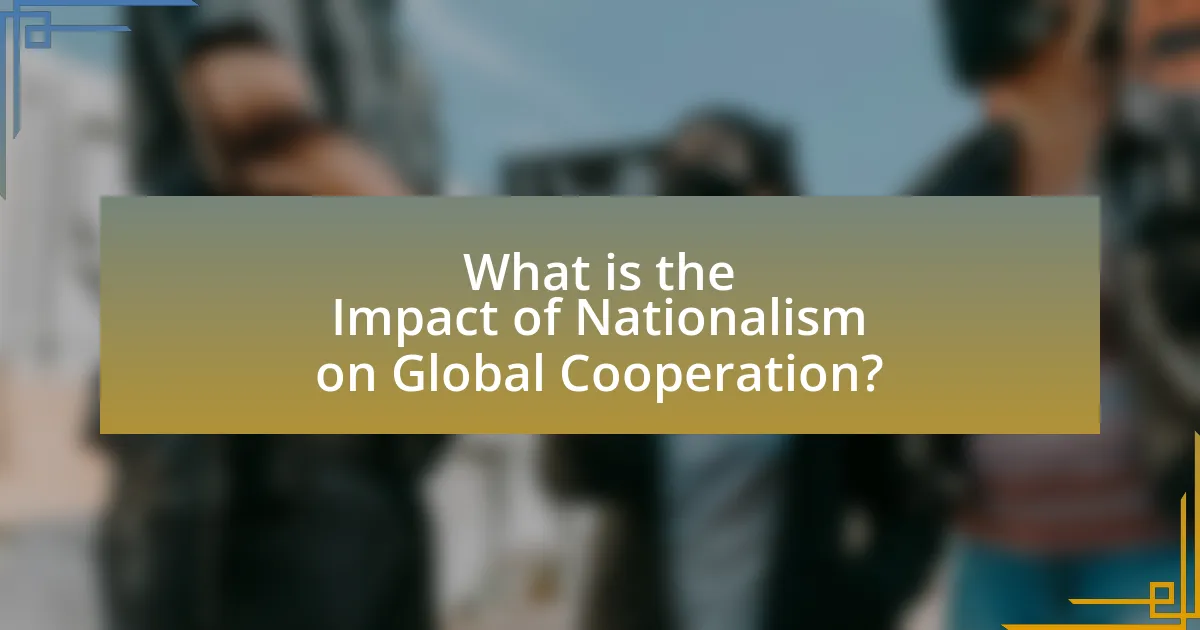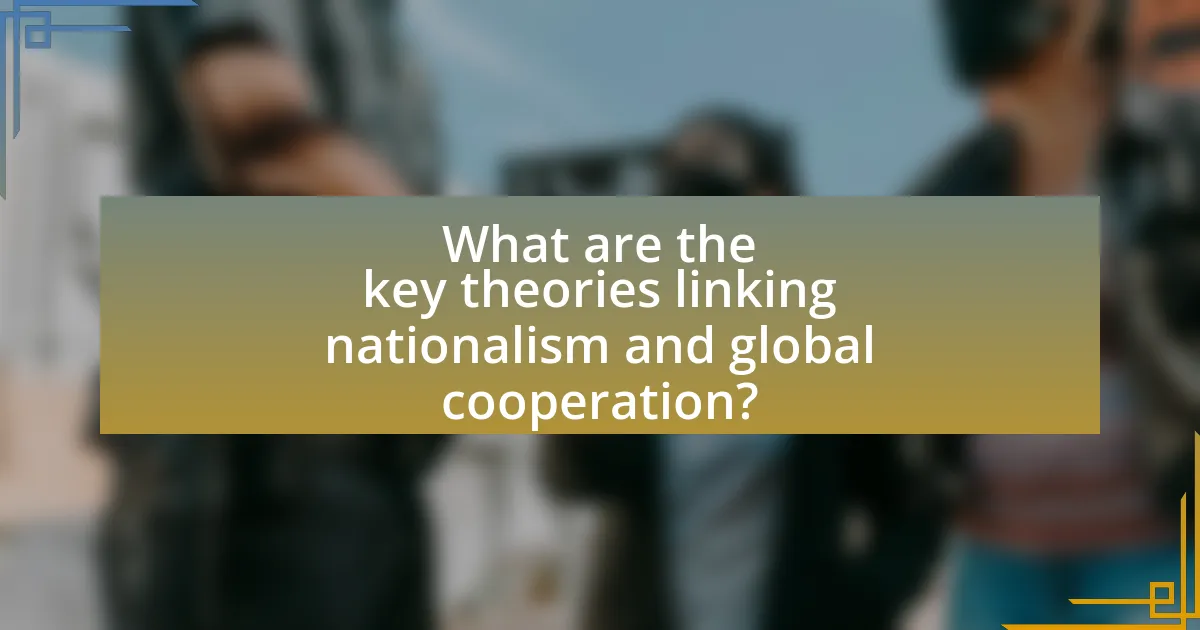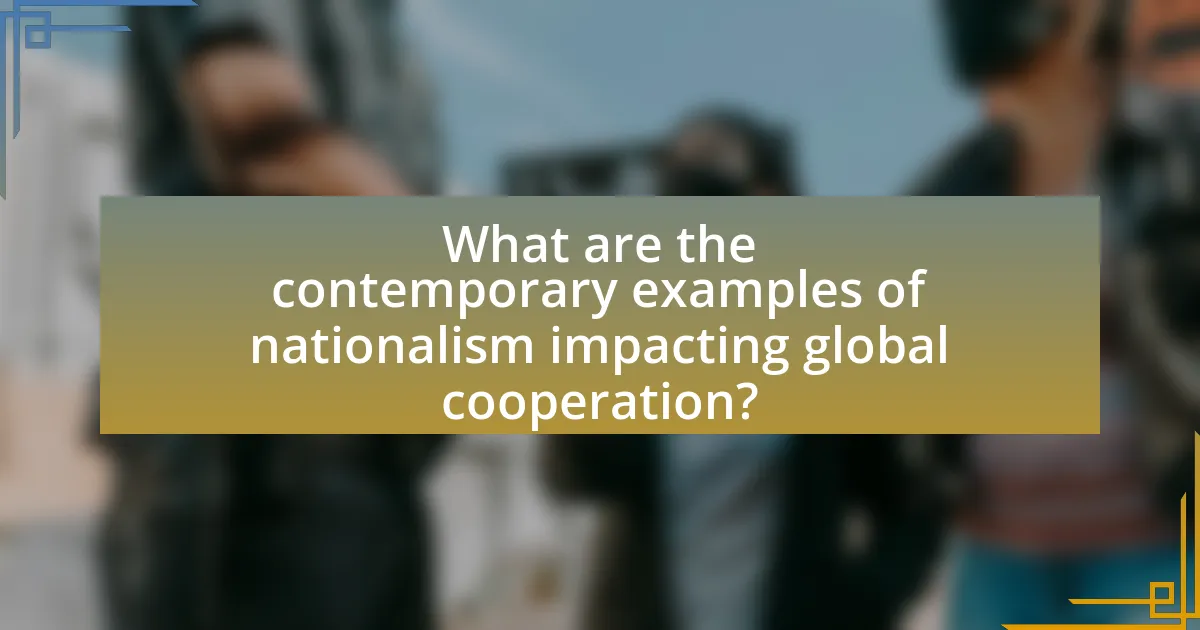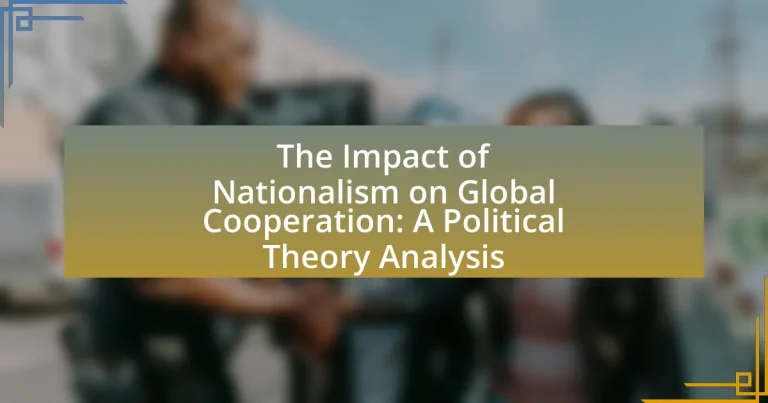The article examines the impact of nationalism on global cooperation through a political theory lens. It highlights how nationalism fosters exclusivity and prioritizes national interests, leading to protectionist policies and withdrawal from international agreements, which disrupt collaborative efforts on global challenges such as climate change and pandemics. The analysis includes historical contexts, contemporary examples, and theoretical frameworks that illustrate the relationship between nationalism and international relations, emphasizing the need for understanding nationalism to navigate its barriers to global cooperation. Additionally, it discusses strategies to mitigate nationalism’s negative effects and enhance international collaboration.

What is the Impact of Nationalism on Global Cooperation?
Nationalism negatively impacts global cooperation by fostering a sense of exclusivity and prioritizing national interests over collective global goals. This phenomenon can be observed in various instances, such as the rise of protectionist policies and withdrawal from international agreements, which undermine collaborative efforts to address global challenges like climate change and pandemics. For example, the United States’ withdrawal from the Paris Agreement in 2017 exemplifies how nationalist policies can disrupt international cooperation aimed at combating climate change. Additionally, nationalist rhetoric often leads to increased tensions between countries, making diplomatic negotiations more difficult and reducing the effectiveness of multilateral organizations.
How does nationalism influence international relations?
Nationalism significantly influences international relations by prioritizing national interests over global cooperation. This prioritization often leads to increased tensions between nations, as countries may adopt protectionist policies, withdraw from international agreements, or engage in unilateral actions that undermine collective efforts. For instance, the rise of nationalist movements in various countries has resulted in the rejection of multilateral trade agreements, as seen in the United States’ withdrawal from the Trans-Pacific Partnership in 2017. Such actions illustrate how nationalism can disrupt established diplomatic relationships and hinder collaborative problem-solving on global issues like climate change and security.
What are the historical contexts of nationalism affecting global cooperation?
Nationalism has historically influenced global cooperation by fostering a sense of identity and loyalty to the nation-state, often at the expense of international collaboration. For instance, the rise of nationalism in the 19th century, particularly in Europe, led to the formation of nation-states and the prioritization of national interests over collective global goals, as seen in the lead-up to World War I. The Treaty of Versailles in 1919 exemplified this, as it imposed punitive measures on Germany, driven by nationalist sentiments, which ultimately destabilized Europe and hindered future cooperation. Additionally, the post-World War II era saw the establishment of international organizations like the United Nations, yet nationalist movements in various regions, such as decolonization in Africa and Asia, often complicated efforts for global governance and cooperation. These historical contexts illustrate how nationalism can create barriers to collaboration by emphasizing sovereignty and national interests over shared global challenges.
How do nationalist movements shape foreign policy decisions?
Nationalist movements significantly shape foreign policy decisions by prioritizing national interests and identity over international cooperation. These movements often lead to policies that emphasize sovereignty, territorial integrity, and cultural preservation, which can result in a more isolationist or aggressive stance in international relations. For instance, the rise of nationalist sentiments in countries like the United States during the Trump administration led to a withdrawal from international agreements such as the Paris Climate Accord and the Iran Nuclear Deal, reflecting a shift towards unilateralism. Additionally, nationalist movements can influence public opinion, pressuring governments to adopt policies that resonate with nationalistic sentiments, as seen in Brexit, where the desire for national control over immigration and trade significantly impacted the UK’s foreign policy direction.
Why is understanding nationalism crucial for global cooperation?
Understanding nationalism is crucial for global cooperation because it shapes the identities, interests, and policies of nations, influencing their willingness to engage in collaborative efforts. Nationalism can foster unity within a country, but it may also lead to isolationism and conflict when national interests clash with global priorities. For instance, the rise of nationalist movements in various countries has often resulted in resistance to international agreements, such as climate accords or trade pacts, which require collective action. Historical examples, such as the Brexit referendum, illustrate how nationalist sentiments can disrupt established cooperative frameworks, highlighting the need for a nuanced understanding of nationalism to navigate and mitigate its potential barriers to global collaboration.
What role does nationalism play in shaping national identity?
Nationalism plays a crucial role in shaping national identity by fostering a sense of belonging and unity among individuals within a nation. This collective identity is often built on shared history, culture, language, and values, which nationalism emphasizes to create a cohesive national narrative. For instance, the rise of nationalism in the 19th century led to the unification of Italy and Germany, where common cultural elements were highlighted to forge a national identity. Additionally, nationalism can influence political structures and policies, as seen in countries like India, where the independence movement was deeply rooted in nationalistic sentiments that sought to define and protect a distinct national identity against colonial rule.
How does nationalism affect perceptions of global governance?
Nationalism significantly influences perceptions of global governance by prioritizing national interests over international cooperation. This prioritization often leads to skepticism towards global institutions and agreements, as nationalists may view them as threats to sovereignty. For instance, the rise of nationalist movements in various countries has resulted in increased resistance to multilateral agreements, such as the Paris Agreement on climate change, where nations prioritize domestic policies over collective global action. Research indicates that nationalist sentiments can diminish trust in international organizations, as seen in the backlash against the United Nations and the European Union in several member states, where citizens express concerns about loss of control and cultural identity.

What are the key theories linking nationalism and global cooperation?
Key theories linking nationalism and global cooperation include the theory of cosmopolitan nationalism, which posits that national identity can coexist with global responsibilities, and the theory of liberal nationalism, which argues that national self-determination can enhance global cooperation by fostering democratic values. Cosmopolitan nationalism suggests that individuals can embrace both their national identity and a commitment to global justice, as seen in the European Union’s integration efforts, where member states maintain their national identities while cooperating on shared goals. Liberal nationalism emphasizes that a strong national identity can lead to a more engaged citizenry, which is essential for supporting international cooperation, as evidenced by the rise of global movements advocating for climate action that originate from national contexts. These theories illustrate how nationalism can be reconciled with global cooperation, promoting a framework where national interests align with global challenges.
How do political theories explain the relationship between nationalism and global cooperation?
Political theories explain the relationship between nationalism and global cooperation by highlighting the tension between national interests and collective global goals. Nationalism often prioritizes the sovereignty and identity of a nation-state, which can lead to resistance against international agreements that are perceived to undermine national autonomy. For instance, realist theories emphasize that states act primarily in their self-interest, which can result in a reluctance to engage in global cooperation if it threatens national security or economic interests. Conversely, liberal theories argue that nationalism can coexist with global cooperation when nations recognize mutual benefits, such as trade agreements or climate change initiatives, which require collaborative efforts. Historical examples, such as the European Union’s formation, illustrate how nations can overcome nationalist sentiments to achieve greater economic and political integration, demonstrating that while nationalism can pose challenges, it can also motivate states to cooperate on shared global issues.
What are the main theoretical frameworks used in this analysis?
The main theoretical frameworks used in this analysis are constructivism, realism, and liberalism. Constructivism examines how national identities and narratives shape international relations, emphasizing the role of social constructs in global cooperation. Realism focuses on the competitive nature of states and the pursuit of national interests, highlighting how nationalism can hinder collaborative efforts. Liberalism, on the other hand, explores the potential for cooperation through international institutions and interdependence, suggesting that nationalism can be reconciled with global governance. These frameworks provide a comprehensive understanding of the dynamics between nationalism and global cooperation.
How do these theories address the challenges of global cooperation?
Theories addressing the challenges of global cooperation, particularly in the context of nationalism, emphasize the tension between national interests and collective global goals. Realist theories highlight that states prioritize their sovereignty and security, often leading to competition rather than collaboration. For instance, during the COVID-19 pandemic, countries prioritized national vaccine distribution over equitable global access, illustrating the realist perspective. Conversely, liberal theories advocate for international institutions and cooperation, suggesting that shared interests can mitigate nationalist tendencies. The European Union serves as a concrete example, where member states have successfully collaborated on economic and political issues despite national differences. These theories collectively illustrate that while nationalism poses significant challenges to global cooperation, frameworks exist that promote collaboration through shared interests and institutional support.
What are the implications of nationalism on international organizations?
Nationalism significantly impacts international organizations by fostering a focus on national sovereignty over collective action. This prioritization can lead to reduced cooperation among member states, as nations may resist ceding authority to supranational entities, undermining the effectiveness of organizations like the United Nations or the European Union. For instance, the rise of nationalist movements has resulted in countries withdrawing from international agreements, such as the United Kingdom’s exit from the EU, which illustrates how nationalism can disrupt established frameworks for global governance. Additionally, nationalist rhetoric often emphasizes unilateralism, which can hinder collaborative efforts to address global challenges like climate change or security threats, ultimately weakening the capacity of international organizations to function effectively.
How does nationalism affect the effectiveness of international treaties?
Nationalism significantly undermines the effectiveness of international treaties by prioritizing national interests over collective agreements. When countries adopt a nationalist stance, they often resist compliance with international obligations, viewing them as infringements on sovereignty. For instance, the United States’ withdrawal from the Paris Agreement in 2017, driven by nationalist sentiments, illustrates how domestic political agendas can derail global climate initiatives. This resistance can lead to fragmented cooperation, as nations may prioritize unilateral actions that conflict with treaty commitments, ultimately diminishing the overall efficacy of international agreements.
What challenges do international organizations face due to nationalist sentiments?
International organizations face significant challenges due to nationalist sentiments, primarily including reduced cooperation among member states and increased tensions in diplomatic relations. Nationalist movements often prioritize domestic interests over international commitments, leading to withdrawal from treaties and agreements, as seen with the United Kingdom’s exit from the European Union. This shift can undermine collective action on global issues such as climate change, security, and trade, as countries may refuse to collaborate on initiatives perceived as compromising national sovereignty. Additionally, nationalist rhetoric can foster xenophobia and isolationism, complicating humanitarian efforts and international aid, as evidenced by the rise of anti-immigrant policies in various nations. These dynamics hinder the effectiveness of international organizations in addressing transnational challenges, ultimately threatening global stability and cooperation.

What are the contemporary examples of nationalism impacting global cooperation?
Contemporary examples of nationalism impacting global cooperation include Brexit, the rise of populist leaders in various countries, and the United States’ withdrawal from international agreements. Brexit, which resulted in the United Kingdom leaving the European Union, exemplifies how nationalist sentiments can disrupt regional alliances and economic cooperation. The populist movements in countries like Brazil, Hungary, and Italy have led to policies that prioritize national interests over international collaboration, affecting global trade and climate agreements. Additionally, the United States’ withdrawal from the Paris Agreement under the Trump administration demonstrated how nationalism can hinder collective efforts to address global challenges like climate change, as it shifted focus from multilateral commitments to unilateral actions. These instances illustrate the significant influence of nationalism on the dynamics of global cooperation.
How have recent nationalist movements influenced global policies?
Recent nationalist movements have significantly influenced global policies by promoting protectionist measures and reshaping international relations. For instance, the rise of nationalist leaders in countries like the United States and the United Kingdom has led to policies such as the withdrawal from international agreements, including the Paris Climate Accord and Brexit, which emphasize national sovereignty over global cooperation. These movements have resulted in a shift towards prioritizing domestic interests, often at the expense of multilateral collaboration, as seen in the increasing tariffs and trade barriers implemented by various nations. This trend has been documented in studies showing a correlation between nationalist rhetoric and a decline in international trade agreements, indicating a tangible impact on global economic policies.
What are specific case studies illustrating this impact?
Specific case studies illustrating the impact of nationalism on global cooperation include the Brexit referendum in the United Kingdom and the rise of populist movements in various countries. The Brexit decision in 2016, driven by nationalist sentiments, led to significant disruptions in trade relationships and diplomatic ties between the UK and EU member states, showcasing how nationalism can hinder international collaboration. Additionally, the election of leaders like Donald Trump in the United States and Jair Bolsonaro in Brazil, who emphasized nationalist policies, resulted in a retreat from multilateral agreements such as the Paris Climate Accord and trade pacts, further demonstrating the detrimental effects of nationalism on global cooperation. These examples highlight the tangible consequences of nationalist ideologies on international relations and collaborative efforts.
How do these examples reflect broader trends in nationalism?
These examples reflect broader trends in nationalism by illustrating the increasing emphasis on national identity and sovereignty over global cooperation. Nationalism has surged in various regions, leading to policies that prioritize domestic interests, often at the expense of international collaboration. For instance, the rise of populist leaders in countries like the United States and Brazil has been marked by rhetoric that champions national interests, as seen in the “America First” policy and Brazil’s rejection of international climate agreements. This trend is supported by data indicating that countries with rising nationalist sentiments often experience a decline in participation in multilateral organizations, as evidenced by the United Kingdom’s Brexit decision, which was driven by a desire to reclaim national sovereignty. Such examples underscore a shift towards isolationism and a reluctance to engage in cooperative global governance, reflecting a broader trend where nationalism increasingly shapes political landscapes and international relations.
What strategies can be employed to mitigate the negative effects of nationalism on global cooperation?
To mitigate the negative effects of nationalism on global cooperation, fostering inclusive international dialogue is essential. This can be achieved through multilateral forums such as the United Nations, where diverse nations collaborate on shared challenges, promoting understanding and reducing isolationist tendencies. Historical evidence shows that initiatives like the European Union have successfully encouraged cooperation among member states by prioritizing collective interests over nationalistic agendas. Additionally, educational programs that emphasize global citizenship can cultivate a sense of interconnectedness, counteracting divisive nationalist narratives. Research indicates that countries with strong educational frameworks promoting global awareness tend to engage more positively in international cooperation, as seen in Scandinavian nations.
What role do diplomacy and dialogue play in addressing nationalist challenges?
Diplomacy and dialogue are essential tools for mitigating nationalist challenges by fostering understanding and cooperation among conflicting parties. These mechanisms enable nations to engage in constructive conversations, addressing grievances and finding common ground, which is crucial in a globalized world where nationalism can lead to isolationism and conflict. Historical examples, such as the European Union’s diplomatic efforts post-World War II, illustrate how dialogue can transform hostile relationships into collaborative partnerships, thereby enhancing stability and peace. Furthermore, diplomatic negotiations often result in treaties and agreements that promote mutual interests, demonstrating that effective communication can counteract the divisive nature of nationalism.
How can international cooperation be strengthened despite rising nationalism?
International cooperation can be strengthened despite rising nationalism by fostering multilateral dialogue and establishing shared goals among nations. Initiatives such as international treaties and agreements, like the Paris Agreement on climate change, demonstrate how countries can collaborate on global challenges while respecting national interests. Furthermore, organizations like the United Nations facilitate platforms for dialogue, allowing nations to address common issues collectively, which can mitigate the divisive effects of nationalism. Historical examples, such as the post-World War II reconstruction efforts led by the Marshall Plan, illustrate that cooperative frameworks can lead to mutual benefits, reinforcing the importance of collaboration over isolationism.
What best practices can enhance global cooperation in a nationalist context?
Best practices that can enhance global cooperation in a nationalist context include fostering dialogue between nations, promoting mutual respect for sovereignty, and encouraging collaborative problem-solving on transnational issues. Dialogue facilitates understanding and reduces tensions, as evidenced by the success of diplomatic negotiations in resolving conflicts, such as the Good Friday Agreement in Northern Ireland. Respect for sovereignty allows nations to engage without feeling threatened, which is crucial for cooperation, as seen in the European Union’s approach to member states’ autonomy while promoting collective goals. Collaborative problem-solving, particularly on issues like climate change and public health, demonstrates that shared challenges can unite nations, as illustrated by the Paris Agreement, where countries committed to collective action despite differing national interests.


